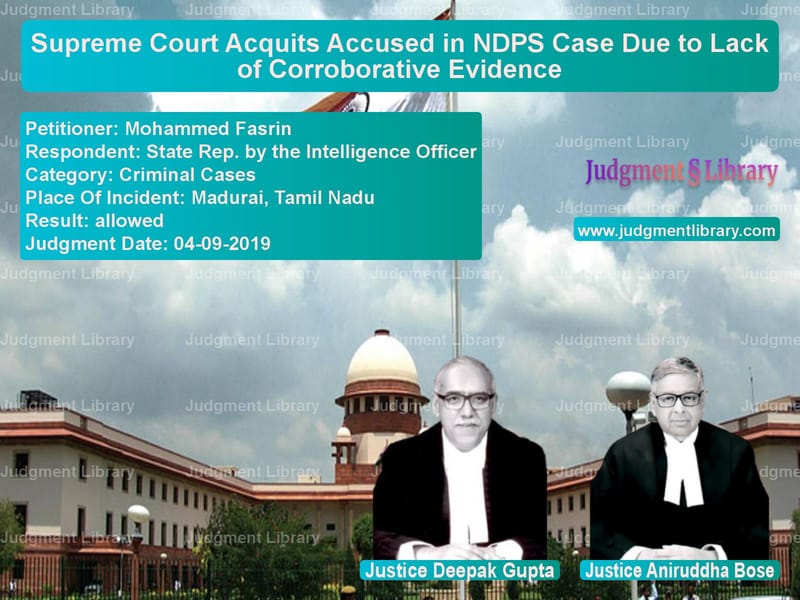Supreme Court Acquits Accused in NDPS Case Due to Lack of Corroborative Evidence
The case of Mohammed Fasrin v. State Rep. by the Intelligence Officer revolved around the conviction of the appellant under the Narcotic Drugs and Psychotropic Substances Act, 1985 (NDPS Act). The primary question before the Supreme Court was whether the appellant’s conviction was sustainable when the prosecution relied mainly on the confessional statements of the accused and co-accused without any independent corroborative evidence.
The Supreme Court ultimately ruled in favor of the appellant, overturning the conviction and holding that the prosecution had failed to establish the appellant’s involvement beyond a reasonable doubt.
Background and Key Issues
The case arose from the alleged smuggling of 7.4 kg of heroin in Tamil Nadu. The prosecution contended that the contraband was part of an international drug trafficking network and that the appellant was involved in financing and facilitating the operation.
The key legal questions before the Supreme Court were:
- Was the appellant’s conviction under the NDPS Act justified in the absence of independent corroborative evidence?
- Were the confessions of the co-accused and the appellant sufficient to sustain a conviction?
- Did the prosecution establish beyond a reasonable doubt that the appellant financed the illicit trafficking of narcotics?
Arguments of the Petitioner (Mohammed Fasrin)
- The only evidence against the appellant was the confessional statement of a co-accused and his own confession, which were recorded under Section 67 of the NDPS Act.
- No independent witness or material evidence corroborated the allegations against the appellant.
- The alleged financiers and middlemen, including one ‘Mohammed from Bombay’ and ‘Nalliappan,’ were neither examined nor included as accused.
- The appellant was not present at the location where the drugs were seized.
- The prosecution failed to establish any direct financial transactions linking the appellant to the seized narcotics.
Arguments of the Respondent (State)
- The co-accused’s confessional statement clearly implicated the appellant as the final recipient of the contraband.
- The appellant’s own confession was voluntarily given and should be treated as substantive evidence under Section 67 of the NDPS Act.
- The NDPS Act has stringent provisions, and the burden of proof lies heavily on the accused to prove his innocence.
- Even if there was no direct seizure from the appellant, his involvement in the financing and facilitation of drug trafficking was sufficiently established.
Supreme Court’s Key Observations
1. Confessional Statement of Co-Accused is a Weak Form of Evidence
“The confession of a co-accused is a very weak type of evidence which needs to be corroborated by some other independent evidence. The prosecution has failed to bring such corroborative evidence on record.”
The Court emphasized that while a co-accused’s confession can give investigative leads, it cannot be the sole basis of conviction.
2. Section 67 Statements Must be Voluntary and Corroborated
“Even if a statement under Section 67 of the NDPS Act is admissible, the Court must be satisfied that it was voluntary and free from coercion. The absence of corroborative evidence makes the statement unreliable.”
The Court reiterated that a conviction cannot be based solely on a statement given in custody without independent supporting evidence.
3. No Independent Evidence Linking the Appellant to the Offense
“Apart from the confessional statements, there is no evidence—documentary, electronic, or material—that establishes the appellant’s involvement in drug financing or trafficking.”
The Court found that the prosecution had failed to prove any financial link between the appellant and the drug trafficking operation.
4. Prosecution Failed to Prove Beyond a Reasonable Doubt
“Criminal trials require proof beyond reasonable doubt. The absence of direct evidence linking the appellant to the seized contraband creates a significant gap in the prosecution’s case.”
The Court ruled that the failure to establish conclusive proof meant the benefit of doubt had to be given to the appellant.
Final Judgment
The Supreme Court set aside the High Court’s judgment and ruled that:
- The appellant’s conviction under Sections 8(c), 21, 23(c), and 27(A) of the NDPS Act was unsustainable.
- The lack of corroborative evidence meant the prosecution had failed to prove its case beyond a reasonable doubt.
- The appellant was acquitted of all charges, and his bail bonds were discharged.
Impact of the Judgment
- Strengthens the Requirement for Corroborative Evidence: Confessions under Section 67 of the NDPS Act alone cannot be the basis for conviction.
- Reaffirms the Principle of Proof Beyond Reasonable Doubt: Reinforces that stringent laws do not dilute the fundamental requirement of proving guilt beyond doubt.
- Restricts Arbitrary Prosecution Under the NDPS Act: Ensures that individuals are not convicted based on weak or unverified confessions.
- Protects Against Misuse of Co-Accused Confessions: Establishes that confessions by co-accused require independent corroboration.
The Supreme Court’s decision upholds the principle that an accused cannot be convicted solely on the basis of uncorroborated confessions, ensuring fairness in trials under the NDPS Act.
Petitioner Name: Mohammed Fasrin.Respondent Name: State Rep. by the Intelligence Officer.Judgment By: Justice Deepak Gupta, Justice Aniruddha Bose.Place Of Incident: Madurai, Tamil Nadu.Judgment Date: 04-09-2019.
Don’t miss out on the full details! Download the complete judgment in PDF format below and gain valuable insights instantly!
Download Judgment: Mohammed Fasrin vs State Rep. by the In Supreme Court of India Judgment Dated 04-09-2019.pdf
Direct Downlaod Judgment: Direct downlaod this Judgment
See all petitions in Drug Possession Cases
See all petitions in Judgment by Deepak Gupta
See all petitions in Judgment by Aniruddha Bose
See all petitions in allowed
See all petitions in supreme court of India judgments September 2019
See all petitions in 2019 judgments
See all posts in Criminal Cases Category
See all allowed petitions in Criminal Cases Category
See all Dismissed petitions in Criminal Cases Category
See all partially allowed petitions in Criminal Cases Category







